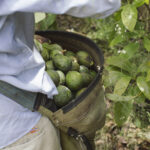U.S. Supreme Court says union recruiting on California farms unconstitutional

The Supreme Court on Wednesday ruled that a California regulation allowing union organizers to recruit agricultural workers at their workplaces violated their employers' constitutional rights.
The ruling was the latest blow to unions from a court that has issued several decisions limiting the power of organized labor, The New York Times reports.
The vote was 6 to 3, with the court’s three liberal members in dissent.
Chief Justice John G. Roberts Jr., writing for the majority, wrote that “the access regulation grants labor organizations a right to invade the growers’ property.” That meant, he wrote, that it was a taking of private property without just compensation.
The case, Cedar Point Nursery v. Hassid, No. 20-107, arose from organizing efforts in 2015 at Fowler Packing Company, a shipper of table grapes and citrus, and Cedar Point Nursery, which grows strawberry plants. The company sued California officials in 2016, saying the regulation letting unions to have access to their properties amounted to a government taking of private property without compensation. The growers lost in the lower courts.
The state regulation, issued in 1975 and unique in the nation, allows union organizers to meet with agricultural workers at work sites in the hour before and after work and during lunch breaks for as many as 120 days a year.
The regulation’s drafters said this was the only practical way to give farmworkers, who can be nomadic and poorly educated, a realistic chance to consider joining a union.
The Pacific Legal Foundation, who represented Cedar Point Nursery, said in a statement following the ruling that the Supreme Court's ruling is a "victory for property owners".
"In 2015, union activists stormed Cedar Point Nursery to harass the farm workers who work there in an effort to get them to join the United Farm Workers union," it said.
"The farm owner, Mike Fahner, didn’t give the union permission to come onto the property and didn’t know they were coming. But worst of all, Fahner wasn’t legally allowed to tell them to leave because of a California law that allows union activists to invade private property to recruit new members."
Unions have said the rule in practice affords them little time to reach workers during the narrow window of seasonal farm work either before or after work. They have said that farm workers often are migrants who change job sites frequently and may not understand English or Spanish, making work site access one of the only ways to inform them of their labor rights.
Both companies called the regulation outdated. They said farm employees are easier to reach than ever, including through smartphones and radio stations, and that nearly all of their 3,000 workers can communicate in English and Spanish.
In response to the decision, Western Growers President and CEO Dave Puglia said: “This is a simple property rights case."
"States cannot take private property without just compensation, and property owners have the fundamental right to exclude trespassers. We applaud the Supreme Court for protecting the notion of private property rights as envisioned in our Constitution.
"We also commend Cedar Point Nursery, Fowler Packing Company and the Pacific Legal Foundation team for seeing this case through to its unequivocal conclusion.”
The California Fresh Fruit Association (CFFA) also said it is pleased with the decision. President Ian LeMay said: “Today’s ruling involving Cedar Point Nursery and CFFA member Fowler Packing protects the constitutional rights of agricultural employers and brings the ALRA access rule into alignment with the National Labor Relations Act.
"For 45 years, California's farmers have seen their property rights ignored by the Agricultural Labor Relations Board by allowing organizers onto their property. No other
industry in the United States, including California, has had to allow union organizers onto their property in a similar manner.
"We appreciate both Fowler Packing and Cedar Point’s efforts in leading the fight to restore the same property rights that are enjoyed by all other industries in the United States, to California farmers."














































